 Ruger arguably started the .380 caliber pocket pistol revolution with the Light Compact Pistol, known simply as the LCP. Sure, there had been other small pistols before the LCP but none energized the industry and created a demand for new holsters, accessories and especially ammunition like the LCP. Despite turning them out at their Prescott, Arizona factory by the gazillions Ruger was hard pressed to keep up with demand and ammo companies were flooded with orders for new defensive .380 ammunition. New ammunition, holsters, lasers and lights were developed for the LCP and Ruger ended up making them in in just about any color you can imagine to satisfy the orders from outfits like Talo and the Gallery of Guns for specialty pistols. I can't say how many combinations of colors have been produced but I've seen displays in the factory making up dozens of frame colors.
Ruger arguably started the .380 caliber pocket pistol revolution with the Light Compact Pistol, known simply as the LCP. Sure, there had been other small pistols before the LCP but none energized the industry and created a demand for new holsters, accessories and especially ammunition like the LCP. Despite turning them out at their Prescott, Arizona factory by the gazillions Ruger was hard pressed to keep up with demand and ammo companies were flooded with orders for new defensive .380 ammunition. New ammunition, holsters, lasers and lights were developed for the LCP and Ruger ended up making them in in just about any color you can imagine to satisfy the orders from outfits like Talo and the Gallery of Guns for specialty pistols. I can't say how many combinations of colors have been produced but I've seen displays in the factory making up dozens of frame colors.
While the LCP is admired for its small size and light weight there are some drawbacks. The sights, so to speak, are miniscule and generally useless and the long, double action trigger pull is difficult to manage. The slide lock fails to lock back after the last shot is fired and the slide is difficult to rack for some shooters. Of course, none of this keeps people from buying LCPs by the bucket-full, but Ruger listened and the new LCP II solves all of these issues.
 At first glance the old and new pistols seem much the same – and they are – but there are subtle differences. Starting on the outside, the grip portion of the frame has a new texture and contour similar in appearance to the frame of the Ruger American pistol. The sandpaper texture is grippy but not abrasive and the grip is ever so slightly wider and flatter at the rear to help spread recoil out and direct it into the palm of the hand. It also makes the pistol point better; it points perfectly for me, whereas the thinner LCP doesn't center in my hand and points to the right. The triggerguard of the LCP is smooth and describes an arc but the one on the LCP II is somewhat squared off, textured on the front surface and allows a lot more room to get a big or gloved finger into the triggerqguard. The new pistol is very slightly taller, longer, heavier and wider than the LCP. The new slide has cocking serrations fore and aft and is easier to grasp and rack. The slide lock button on the left side of the frame is longer and the slide locks to the rear after the last shot is fired or when racked if a magazine is in place. Lastly, the LCP II has fixed sights you can actually see and use, although I'm probably going to paint the face of the front sight orange or red or green or pink… or some color I can see.
At first glance the old and new pistols seem much the same – and they are – but there are subtle differences. Starting on the outside, the grip portion of the frame has a new texture and contour similar in appearance to the frame of the Ruger American pistol. The sandpaper texture is grippy but not abrasive and the grip is ever so slightly wider and flatter at the rear to help spread recoil out and direct it into the palm of the hand. It also makes the pistol point better; it points perfectly for me, whereas the thinner LCP doesn't center in my hand and points to the right. The triggerguard of the LCP is smooth and describes an arc but the one on the LCP II is somewhat squared off, textured on the front surface and allows a lot more room to get a big or gloved finger into the triggerqguard. The new pistol is very slightly taller, longer, heavier and wider than the LCP. The new slide has cocking serrations fore and aft and is easier to grasp and rack. The slide lock button on the left side of the frame is longer and the slide locks to the rear after the last shot is fired or when racked if a magazine is in place. Lastly, the LCP II has fixed sights you can actually see and use, although I'm probably going to paint the face of the front sight orange or red or green or pink… or some color I can see.
 The new pistol is a hammer fired single action but you won't see the hammer unless you look through the slot in the rear of the slide. The LCP is a double action design with a long trigger travel necessary to cock the hammer and fire the pistol. While the new trigger has quite a bit of takeup the hammer remains cocked after a round is chambered and the trigger needs only release the sear. According to my electronic trigger gizmo the trigger on my sample pistol breaks at an average of about 6 ¾ pounds. While the old and new magazines look the same and can be used in either pistol only the new magazine locks the slide to the rear on empty in the LCP II. The pistol ships with one magazine and two base plates, one flat and the other hooked for a finger rest. Regardless, with the short frame I'm only able to get two fingers wrapped around the pistol. The LCP II does not fit in some holsters designed for the LCP but Ruger ships the pistol with a very nice pocket holster that can be used in the pocket, in a purse or slipped into the waistband. To use a pocket holster safely, always remove the holster from the pocket or waistband when holstering. Carefully place the pistol in the holster with your finger straight, off the trigger and mindful of not pointing the pistol at your hand; carefully place the holstered pistol in your carry position.
The new pistol is a hammer fired single action but you won't see the hammer unless you look through the slot in the rear of the slide. The LCP is a double action design with a long trigger travel necessary to cock the hammer and fire the pistol. While the new trigger has quite a bit of takeup the hammer remains cocked after a round is chambered and the trigger needs only release the sear. According to my electronic trigger gizmo the trigger on my sample pistol breaks at an average of about 6 ¾ pounds. While the old and new magazines look the same and can be used in either pistol only the new magazine locks the slide to the rear on empty in the LCP II. The pistol ships with one magazine and two base plates, one flat and the other hooked for a finger rest. Regardless, with the short frame I'm only able to get two fingers wrapped around the pistol. The LCP II does not fit in some holsters designed for the LCP but Ruger ships the pistol with a very nice pocket holster that can be used in the pocket, in a purse or slipped into the waistband. To use a pocket holster safely, always remove the holster from the pocket or waistband when holstering. Carefully place the pistol in the holster with your finger straight, off the trigger and mindful of not pointing the pistol at your hand; carefully place the holstered pistol in your carry position.
 At the range I ran Sig Elite, Hornady Critical Defense and Ruger ARX premium defensive ammunition through the LCP II without a hitch. Shooting the LCP II alongside the LCP proved the improvements to the design make for an easier shooting pistol that handles recoil better and is much easier to shoot accurately.
At the range I ran Sig Elite, Hornady Critical Defense and Ruger ARX premium defensive ammunition through the LCP II without a hitch. Shooting the LCP II alongside the LCP proved the improvements to the design make for an easier shooting pistol that handles recoil better and is much easier to shoot accurately.  The single action trigger and usable sights made it easy for me to shoot fast, accurate failure drills (two to the body, one to the head) at 5 yards on Gunsite's option targets. Backing up, I was able to make hits on a steel plate target at 25 yards, something I simply cannot do with the LCP. The pistol is 100% reliable and I wouldn't hesitate to carry it…as a matter of fact, it's in my pocket right now.
The single action trigger and usable sights made it easy for me to shoot fast, accurate failure drills (two to the body, one to the head) at 5 yards on Gunsite's option targets. Backing up, I was able to make hits on a steel plate target at 25 yards, something I simply cannot do with the LCP. The pistol is 100% reliable and I wouldn't hesitate to carry it…as a matter of fact, it's in my pocket right now.
By the time you read this Ruger will have accessories like spare magazines for the LCP II available at www.shopruger.com and I rather imagine lights lasers, holsters and the like will start appearing in short order. I expect this new model to take off and be another huge success for Ruger so run down to your local arms emporium and get in line. Now if I can find some pink nail polish for that front sight I'll be all set.
For more information: www.ruger.com
About the Author:
 Ed Head is a regular on Shooting Gallery, Gun Stories and Down Range TV. He has worked for almost 30 years in law enforcement, first in the United States Air Force and then with the United States Border Patrol, retiring as a Field Operations Supervisor. During his Border Patrol career, Ed worked in a variety of patrol, investigative and training capacities. Ed has an extensive background as a firearms instructor, having trained thousands, ranging from beginners to police, military and special operations personnel. Having taught at Gunsite for 20 years, Ed first trained there under the world famous shooting school's founder, Jeff Cooper, then later ran the school as the operations manager for more than five years. Ed lives in Chino Valley, Arizona, where he continues to teach and write.
Ed Head is a regular on Shooting Gallery, Gun Stories and Down Range TV. He has worked for almost 30 years in law enforcement, first in the United States Air Force and then with the United States Border Patrol, retiring as a Field Operations Supervisor. During his Border Patrol career, Ed worked in a variety of patrol, investigative and training capacities. Ed has an extensive background as a firearms instructor, having trained thousands, ranging from beginners to police, military and special operations personnel. Having taught at Gunsite for 20 years, Ed first trained there under the world famous shooting school's founder, Jeff Cooper, then later ran the school as the operations manager for more than five years. Ed lives in Chino Valley, Arizona, where he continues to teach and write.
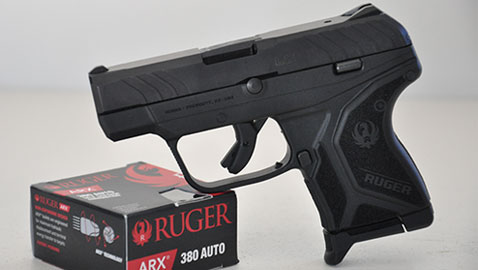
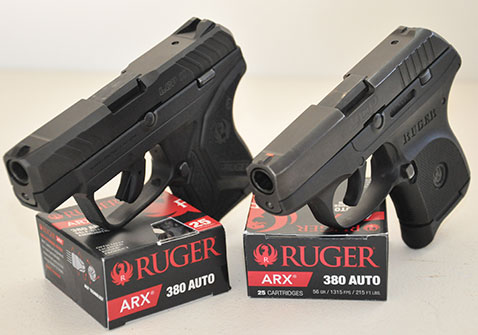
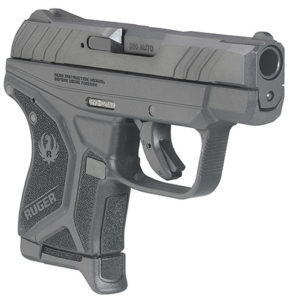
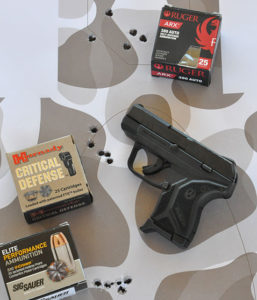
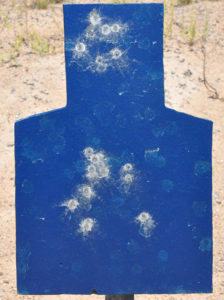
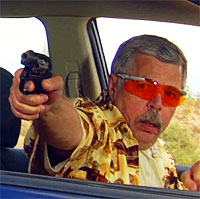
Walang komento:
Mag-post ng isang Komento